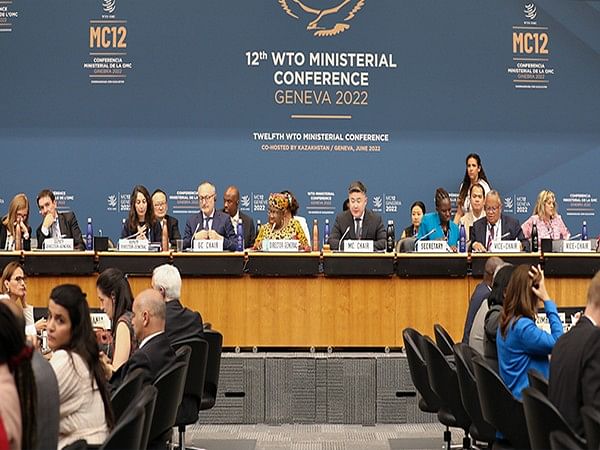Geneva [Switzerland], June 16 (ANI): The meeting with World Trade Organisation went in a positive direction on the last day of the conference, and the Indian delegation led by Union Commerce and Industry Minister Piyush Goyal held a series of negotiations till early morning today, according to sources.
Union Minister for Commerce and Industry Piyush Goyal led the Indian delegation at the 12th World Trade Organisation (WTO) Ministerial Conference on June 12, which was later extended by a day, till June 16.
“WTO negotiations – meetings went on till late night. The Indian delegation, Commerce and Industry Min Piyush Goyal led a series of negotiations till early morning today. Things are moving in a positive direction on the last day of the conference, negotiations to start again shortly,” sources said.
On Wednesday, Piyush Goyal said that India strongly supports robust WTO reforms and a modernisation agenda but the multilateral rule-making processes of the organisation must not be diluted.
Addressing a thematic session yesterday, Goyal said: “the principles of non-discrimination, predictability, transparency very importantly, the tradition of decision making by consensus and the commitment to development underlying the multilateral trading system is sacrosanct.”
Goyal urged the member countries to accord priority to the reform needs, especially to the crisis at the Appellate body, whose functioning should become more transparent and effective. “The number of suggestions for reforming the WTO could result in fundamental changes in the institutional architecture thereby, running the risk of skewing the system against the interest of developing countries,” he said.
He pointed out that the primary objective of the WTO is to serve as the mechanism through which international trade can become the means for supporting the economic development of members, particularly the developing countries and the least developed countries (LDCs).
The World Trade Organization (WTO) is the only global international organization dealing with the rules of trade between nations. At its heart are the WTO agreements, negotiated and signed by the bulk of the world’s trading nations and ratified in their parliaments.
The WTO has 164 members (including European Union) and 23 observer governments (like Iran, Iraq, Bhutan, Libya etc).
The structure of the WTO is dominated by its highest authority, the Ministerial Conference, composed of representatives of all WTO members, which is required to meet at least every two years and which can take decisions on all matters under any of the multilateral trade agreements. (ANI)
This report is auto-generated from ANI news service. ThePrint holds no responsibility for its content.



